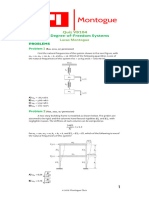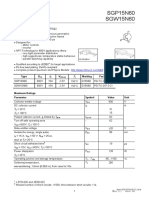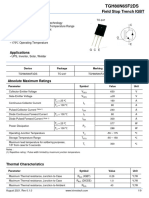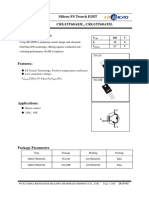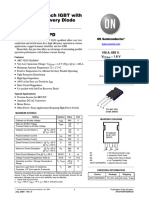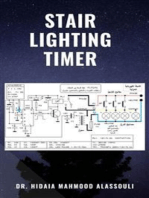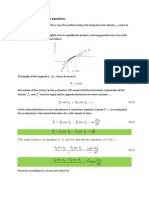GB02N120 2
GB02N120 2
Uploaded by
srikrishCopyright:
Available Formats
GB02N120 2
GB02N120 2
Uploaded by
srikrishCopyright
Available Formats
Share this document
Did you find this document useful?
Is this content inappropriate?
Copyright:
Available Formats
GB02N120 2
GB02N120 2
Uploaded by
srikrishCopyright:
Available Formats
www.DataSheet4U.
com
www.DataSheet4U.com
SGP02N120, SGB02N120
SGD02N120
Fast IGBT in NPT-technology
• 40lower Eoff compared to previous generation
• Short circuit withstand time – 10 µs C
• Designed for:
- Motor controls
- Inverter G
E
- SMPS
• NPT-Technology offers:
- very tight parameter distribution
- high ruggedness, temperature stable behaviour
P-TO-252-3-1 (D-PAK) P-TO-220-3-1 P-TO-263-3-2 (D²-PAK)
- parallel switching capability (TO-252AA) (TO-220AB) (TO-263AB)
• Complete product spectrum and PSpice Models : http://www.infineon.com/igbt/
Type VCE IC Eoff Tj Package Ordering Code
SGP02N120 1200V 2A 0.11mJ 150°C TO-220AB Q67040-S4270
SGB02N120 TO-263AB(D2PAK) Q67040-S4271
SGD02N120 TO-252AA(DPAK) Q67040-S4269
Maximum Ratings
Parameter Symbol Value Unit
Collector-emitter voltage VCE 1200 V
DC collector current IC A
TC = 25°C 6.2
TC = 100°C 2.8
Pulsed collector current, tp limited by Tjmax ICpul s 9.6
Turn off safe operating area - 9.6
VCE ≤ 1200V, Tj ≤ 150°C
Gate-emitter voltage VGE ±20 V
Avalanche energy, single pulse EAS 10 mJ
IC = 2A, VCC = 50V, RGE = 25Ω, start at Tj = 25°C
1)
Short circuit withstand time tSC 10 µs
VGE = 15V, 100V ≤ VCC ≤ 1200V, Tj ≤ 150°C
Power dissipation Ptot 62 W
TC = 25°C
Operating junction and storage temperature Tj , Tstg -55...+150 °C
Soldering temperature, 1.6mm (0.063 in.) from case for 10s - 260
1)
Allowed number of short circuits: <1000; time between short circuits: >1s.
Power Semiconductors 1 Jul-02
www.DataSheet4U.com
www.DataSheet4U.com
SGP02N120, SGB02N120
SGD02N120
Thermal Resistance
Parameter Symbol Conditions Max. Value Unit
Characteristic
IGBT thermal resistance, RthJC 2.0 K/W
junction – case
Thermal resistance, RthJA TO-220AB 62
junction – ambient
1)
SMD version, device on PCB RthJA TO-263AB(D2PAK) 40
Electrical Characteristic, at Tj = 25 °C, unless otherwise specified
Value
Parameter Symbol Conditions Unit
min. typ. max.
Static Characteristic
Collector-emitter breakdown voltage V ( B R ) C E S V G E = 0V , I C = 1 00 µA 1200 - - V
Collector-emitter saturation voltage VCE(sat) V G E = 15 V , I C = 2 A
T j =2 5 °C 2.5 3.1 3.6
T j =1 5 0° C - 3.7 4.3
Gate-emitter threshold voltage VGE(th) I C = 10 0 µA , V C E = V G E 3 4 5
Zero gate voltage collector current ICES V C E = 12 0 0V , V G E = 0V µA
T j =2 5 °C - - 25
T j =1 5 0° C - - 100
Gate-emitter leakage current IGES V C E = 0V , V G E =2 0 V - - 100 nA
Transconductance gfs V C E = 20 V , I C = 2 A 1.5 - S
Dynamic Characteristic
Input capacitance Ciss V C E = 25 V , - 205 250 pF
Output capacitance Coss V G E = 0V , - 20 25
Reverse transfer capacitance Crss f= 1 MH z - 12 14
Gate charge QGate V C C = 96 0 V, I C =2 A - 11 - nC
V G E = 15 V
Internal emitter inductance LE T O - 22 0A B - 7 - nH
measured 5mm (0.197 in.) from case
2)
Short circuit collector current IC(SC) V G E = 15 V ,t S C ≤ 10 µs - 24 - A
10 0 V≤ V C C ≤ 12 0 0 V,
T j ≤ 15 0° C
1) 2
Device on 50mm*50mm*1.5mm epoxy PCB FR4 with 6cm (one layer, 70µm thick) copper area for
collector connection. PCB is vertical without blown air.
2)
Allowed number of short circuits: <1000; time between short circuits: >1s.
Power Semiconductors 2 Jul-02
www.DataSheet4U.com
www.DataSheet4U.com
SGP02N120, SGB02N120
SGD02N120
Switching Characteristic, Inductive Load, at Tj=25 °C
Value
Parameter Symbol Conditions Unit
min. typ. max.
IGBT Characteristic
Turn-on delay time td(on) T j =2 5 °C , - 23 30 ns
Rise time tr V C C = 80 0 V, I C = 2 A, - 16 21
Turn-off delay time td(off) V G E = 15 V /0 V , - 260 340
Fall time tf R G = 91 Ω, - 61 80
1)
L σ =1 8 0n H,
Turn-on energy Eon 1) - 0.16 0.21 mJ
C σ = 4 0p F
Turn-off energy Eoff Energy losses include - 0.06 0.08
Total switching energy Ets “tail” and diode - 0.22 0.29
reverse recovery.
Switching Characteristic, Inductive Load, at Tj=150 °C
Value
Parameter Symbol Conditions Unit
min. typ. max.
IGBT Characteristic
Turn-on delay time td(on) T j =1 5 0° C - 26 31 ns
Rise time tr V C C = 80 0 V, - 14 17
Turn-off delay time td(off) I C = 2 A, - 290 350
Fall time tf V G E = 15 V /0 V , - 85 102
Turn-on energy Eon R G = 91 Ω, - 0.27 0.33 mJ
1)
L σ =1 8 0n H,
Turn-off energy Eoff 1) - 0.11 0.15
C σ = 4 0p F
Total switching energy Ets Energy losses include - 0.38 0.48
“tail” and diode
reverse recovery.
1)
Leakage inductance Lσ and stray capacity Cσ due to dynamic test circuit in figure E.
Power Semiconductors 3 Jul-02
www.DataSheet4U.com
www.DataSheet4U.com
SGP02N120, SGB02N120
SGD02N120
12A Ic
10A
tp=10µs
10A
IC, COLLECTOR CURRENT
IC, COLLECTOR CURRENT
8A 50µs
1A
TC=80°C
150µs
6A
TC=110°C 500µs
4A 0.1A
20ms
2A Ic DC
0A 0.01A
10Hz 100Hz 1kHz 10kHz 100kHz 1V 10V 100V 1000V
f, SWITCHING FREQUENCY VCE, COLLECTOR-EMITTER VOLTAGE
Figure 1. Collector current as a function of Figure 2. Safe operating area
switching frequency (D = 0, TC = 25°C, Tj ≤ 150°C)
(Tj ≤ 150°C, D = 0.5, VCE = 800V,
VGE = +15V/0V, RG = 91Ω)
7A
60W
6A
50W
5A
IC, COLLECTOR CURRENT
Ptot, POWER DISSIPATION
40W
4A
30W
3A
20W
2A
10W 1A
0W 0A
25°C 50°C 75°C 100°C 125°C 25°C 50°C 75°C 100°C 125°C
TC, CASE TEMPERATURE TC, CASE TEMPERATURE
Figure 3. Power dissipation as a function Figure 4. Collector current as a function of
of case temperature case temperature
(Tj ≤ 150°C) (VGE ≤ 15V, Tj ≤ 150°C)
Power Semiconductors 4 Jul-02
www.DataSheet4U.com
www.DataSheet4U.com
SGP02N120, SGB02N120
SGD02N120
7A 7A
6A 6A
5A VGE=17V 5A VGE=17V
IC, COLLECTOR CURRENT
IC, COLLECTOR CURRENT
15V 15V
4A 13V 4A 13V
11V 11V
9V 9V
3A 7V 3A 7V
2A 2A
1A 1A
0A 0A
0V 1V 2V 3V 4V 5V 6V 7V 0V 1V 2V 3V 4V 5V 6V 7V
VCE, COLLECTOR-EMITTER VOLTAGE VCE, COLLECTOR-EMITTER VOLTAGE
Figure 5. Typical output characteristics Figure 6. Typical output characteristics
(Tj = 25°C) (Tj = 150°C)
7A 6V
VCE(sat), COLLECTOR-EMITTER SATURATION VOLTAGE
6A
5V
IC=4A
5A
IC, COLLECTOR CURRENT
4V
4A Tj=+150°C
IC=2A
Tj=+25°C 3V
3A Tj=-40°C IC=1A
2V
2A
1A 1V
0A 0V
3V 5V 7V 9V 11V -50°C 0°C 50°C 100°C 150°C
VGE, GATE-EMITTER VOLTAGE Tj, JUNCTION TEMPERATURE
Figure 7. Typical transfer characteristics Figure 8. Typical collector-emitter
(VCE = 20V) saturation voltage as a function of junction
temperature
(VGE = 15V)
Power Semiconductors 5 Jul-02
www.DataSheet4U.com
www.DataSheet4U.com
SGP02N120, SGB02N120
SGD02N120
td(off)
td(off)
tf
t, SWITCHING TIMES
t, SWITCHING TIMES
100ns
tf
100ns
td(on)
td(on)
tr
tr
10ns 10ns
0A 2A 4A 6A 8A 0Ω 50Ω 100Ω 150Ω
IC, COLLECTOR CURRENT RG, GATE RESISTOR
Figure 9. Typical switching times as a Figure 10. Typical switching times as a
function of collector current function of gate resistor
(inductive load, Tj = 150°C, (inductive load, Tj = 150°C,
VCE = 800V, VGE = +15V/0V, RG = 9 1 Ω, VCE = 800V, VGE = +15V/0V, IC = 2A,
dynamic test circuit in Fig.E) dynamic test circuit in Fig.E)
6V
VGE(th), GATE-EMITTER THRESHOLD VOLTAGE
td(off)
5V
100ns max.
4V
t, SWITCHING TIMES
tf typ.
3V
min.
td(on) 2V
1V
tr
10ns 0V
-50°C 0°C 50°C 100°C 150°C -50°C 0°C 50°C 100°C 150°C
Tj, JUNCTION TEMPERATURE Tj, JUNCTION TEMPERATURE
Figure 11. Typical switching times as a Figure 12. Gate-emitter threshold voltage
function of junction temperature as a function of junction temperature
(inductive load, VCE = 800V, (IC = 0.3mA)
VGE = +15V/0V, IC = 2A, RG = 9 1Ω,
dynamic test circuit in Fig.E)
Power Semiconductors 6 Jul-02
www.DataSheet4U.com
www.DataSheet4U.com
SGP02N120, SGB02N120
SGD02N120
2.0mJ 0.5mJ
*) Eon and Ets include losses *) Eon and Ets include losses
due to diode recovery. due to diode recovery.
Ets*
Ets*
0.4mJ
E, SWITCHING ENERGY LOSSES
E, SWITCHING ENERGY LOSSES
1.5mJ
0.3mJ
Eon*
Eon*
1.0mJ
0.2mJ
0.5mJ
Eoff 0.1mJ Eoff
0.0mJ 0.0mJ
0A 2A 4A 6A 8A 0Ω 50Ω 100Ω 150Ω
IC, COLLECTOR CURRENT RG, GATE RESISTOR
Figure 13. Typical switching energy losses Figure 14. Typical switching energy losses
as a function of collector current as a function of gate resistor
(inductive load, Tj = 150°C, (inductive load, Tj = 150°C,
VCE = 800V, VGE = +15V/0V, RG = 9 1 Ω, VCE = 800V, VGE = +15V/0V, IC = 2A,
dynamic test circuit in Fig.E ) dynamic test circuit in Fig.E )
0.4mJ
*) Eon and Ets include losses
due to diode recovery. Ets*
ZthJC, TRANSIENT THERMAL IMPEDANCE
D=0.5
0
10 K/W
E, SWITCHING ENERGY LOSSES
0.3mJ
0.2
Eon*
0.1
0.2mJ R,(K/W) τ, (s)=
0.05
-1 0.66735 0.04691
10 K/W
0.70472 0.00388
0.62778 0.00041
0.02
0.1mJ 0.01
Eoff
R1 R2
-2
10 K/W
single pulse C 1 = τ 1 / R 1 C 2 = τ 2 /R 2
0.0mJ
-50°C 0°C 50°C 100°C 150°C 1µs 10µs 100µs 1ms 10ms 100ms 1s
Tj, JUNCTION TEMPERATURE tp, PULSE WIDTH
Figure 15. Typical switching energy losses Figure 16. IGBT transient thermal
as a function of junction temperature impedance as a function of pulse width
(inductive load, VCE = 800V, (D = tp / T)
VGE = +15V/0V, IC = 2A, RG = 9 1Ω,
dynamic test circuit in Fig.E )
Power Semiconductors 7 Jul-02
www.DataSheet4U.com
www.DataSheet4U.com
SGP02N120, SGB02N120
SGD02N120
20V
Ciss
VGE, GATE-EMITTER VOLTAGE
15V
C, CAPACITANCE
100pF
10V
UCE=960V
5V
Coss
Crss
0V 10pF
0nC 5nC 10nC 15n 0V 10V 20V 30V
QGE, GATE CHARGE VCE, COLLECTOR-EMITTER VOLTAGE
Figure 17. Typical gate charge Figure 18. Typical capacitance as a
(IC = 2A) function of collector-emitter voltage
(VGE = 0V, f = 1MHz)
30µs 40A
IC(sc), SHORT CIRCUIT COLLECTOR CURRENT
25µs
tsc, SHORT CIRCUIT WITHSTAND TIME
30A
20µs
15µs 20A
10µs
10A
5µs
0µs 0A
10V 11V 12V 13V 14V 15V 10V 12V 14V 16V 18V 20V
VGE, GATE-EMITTER VOLTAGE VGE, GATE-EMITTER VOLTAGE
Figure 19. Short circuit withstand time as a Figure 20. Typical short circuit collector
function of gate-emitter voltage current as a function of gate-emitter voltage
(VCE = 1200V, start at Tj = 25°C) (100V ≤VCE ≤1200V, TC = 25°C, Tj ≤ 150°C)
Power Semiconductors 8 Jul-02
www.DataSheet4U.com
www.DataSheet4U.com
SGP02N120, SGB02N120
SGD02N120
TO-220AB dimensions
symbol [mm] [inch]
min max min max
A 9.70 10.30 0.3819 0.4055
B 14.88 15.95 0.5858 0.6280
C 0.65 0.86 0.0256 0.0339
D 3.55 3.89 0.1398 0.1531
E 2.60 3.00 0.1024 0.1181
F 6.00 6.80 0.2362 0.2677
G 13.00 14.00 0.5118 0.5512
H 4.35 4.75 0.1713 0.1870
K 0.38 0.65 0.0150 0.0256
L 0.95 1.32 0.0374 0.0520
M 2.54 typ. 0.1 typ.
N 4.30 4.50 0.1693 0.1772
P 1.17 1.40 0.0461 0.0551
T 2.30 2.72 0.0906 0.1071
TO-263AB (D2Pak) dimensions
symbol [mm] [inch]
min max min max
A 9.80 10.20 0.3858 0.4016
B 0.70 1.30 0.0276 0.0512
C 1.00 1.60 0.0394 0.0630
D 1.03 1.07 0.0406 0.0421
E 2.54 typ. 0.1 typ.
F 0.65 0.85 0.0256 0.0335
G 5.08 typ. 0.2 typ.
H 4.30 4.50 0.1693 0.1772
K 1.17 1.37 0.0461 0.0539
L 9.05 9.45 0.3563 0.3720
M 2.30 2.50 0.0906 0.0984
N 15 typ. 0.5906 typ.
P 0.00 0.20 0.0000 0.0079
Q 4.20 5.20 0.1654 0.2047
R 8° max 8° max
S 2.40 3.00 0.0945 0.1181
T 0.40 0.60 0.0157 0.0236
U 10.80 0.4252
V 1.15 0.0453
W 6.23 0.2453
X 4.60 0.1811
Y 9.40 0.3701
Z 16.15 0.6358
Power Semiconductors 9 Jul-02
www.DataSheet4U.com
www.DataSheet4U.com
SGP02N120, SGB02N120
SGD02N120
TO-252AA (DPak) dimensions
symbol [mm] [inch]
min max min max
A 6.40 6.73 0.2520 0.2650
B 5.25 5.50 0.2067 0.2165
C (0.65) (1.15) (0.0256) (0.0453)
D 0.63 0.89 0.0248 0.0350
E 2.28 0.2520
F 2.19 2.39 0.0862 0.0941
G 0.76 0.98 0.0299 0.0386
H 0.90 1.21 0.0354 0.0476
K 5.97 6.23 0.2350 0.2453
L 9.40 10.40 0.3701 0.4094
M 0.46 0.58 0.0181 0.0228
N 0.87 1.15 0.0343 0.0453
P 0.51 - 0.0201 -
R 5.00 - 0.1969 -
S 4.17 - 0.1642 -
T 0.26 1.02 0.0102 0.0402
U - - - -
Power Semiconductors 10 Jul-02
www.DataSheet4U.com
www.DataSheet4U.com
SGP02N120, SGB02N120
SGD02N120
i,v
diF /dt tr r =tS +tF
Qr r =QS +QF
tr r
IF tS tF
QS 10% Ir r m t
QF
Ir r m
dir r /dt VR
90% Ir r m
Figure C. Definition of diodes
switching characteristics
τ1 τ2 τn
r1 r2 rn
Tj (t)
p(t)
r1 r2 rn
Figure A. Definition of switching times
TC
Figure D. Thermal equivalent
circuit
Figure B. Definition of switching losses Figure E. Dynamic test circuit
Leakage inductance Lσ =180nH,
and stray capacity Cσ =40pF.
Power Semiconductors 11 Jul-02
www.DataSheet4U.com
www.DataSheet4U.com
SGP02N120, SGB02N120
SGD02N120
Published by
Infineon Technologies AG i Gr.,
Bereich Kommunikation
St.-Martin-Strasse 53,
D-81541 München
© Infineon Technologies AG 1999
All Rights Reserved.
Attention please!
The information herein is given to describe certain components and shall not be considered as warranted characteristics.
Terms of delivery and rights to technical change reserved.
We hereby disclaim any and all warranties, including but not limited to warranties of non-infringement, regarding circuits,
descriptions and charts stated herein.
Infineon Technologies is an approved CECC manufacturer.
Information
For further information on technology, delivery terms and conditions and prices please contact your nearest Infineon
Technologies Office in Germany or our Infineon Technologies Representatives worldwide (see address list).
Warnings
Due to technical requirements components may contain dangerous substances. For information on the types in question
please contact your nearest Infineon Technologies Office.
Infineon Technologies Components may only be used in life-support devices or systems with the express written
approval of Infineon Technologies, if a failure of such components can reasonably be expected to cause the failure of
that life-support device or system, or to affect the safety or effectiveness of that device or system. Life support devices or
systems are intended to be implanted in the human body, or to support and/or maintain and sustain and/or protect
human life. If they fail, it is reasonable to assume that the health of the user or other persons may be endangered.
Power Semiconductors 12 Jul-02
You might also like
- Vibration of Two Degree of Freedom Systems Solved ProblemsDocument17 pagesVibration of Two Degree of Freedom Systems Solved ProblemsDevananda R SNo ratings yet
- SGP02N120 SGD02N120, SGI02N120: Fast IGBT in NPT-technologyDocument14 pagesSGP02N120 SGD02N120, SGI02N120: Fast IGBT in NPT-technologypserednickiNo ratings yet
- SGP04N60, SGB04N60 SGD04N60, SGU04N60: Fast IGBT in NPT-technologyDocument12 pagesSGP04N60, SGB04N60 SGD04N60, SGU04N60: Fast IGBT in NPT-technologymhorfNo ratings yet
- SGP15N60 SGW15N60: Fast IGBT in NPT-technologyDocument11 pagesSGP15N60 SGW15N60: Fast IGBT in NPT-technologyMuhammad ZamanNo ratings yet
- SKB06N60 Rev2 3G-48108Document14 pagesSKB06N60 Rev2 3G-48108charlydigitalNo ratings yet
- SGW25N120Document11 pagesSGW25N120yayayalyayayaNo ratings yet
- SGW15N60Document14 pagesSGW15N60ZekoNo ratings yet
- SGW25N120: Fast IGBT in NPT-technologyDocument11 pagesSGW25N120: Fast IGBT in NPT-technologyaffes electroniqueNo ratings yet
- K20N60 Infineon PDFDocument13 pagesK20N60 Infineon PDFranduNo ratings yet
- SGP30N60HS SGW30N60HS: High Speed IGBT in NPT-technologyDocument12 pagesSGP30N60HS SGW30N60HS: High Speed IGBT in NPT-technologyGaby FigueroaNo ratings yet
- SKW25N120: Fast IGBT in NPT-technology With Soft, Fast Recovery Anti-Parallel Emitter Controlled DiodeDocument13 pagesSKW25N120: Fast IGBT in NPT-technology With Soft, Fast Recovery Anti-Parallel Emitter Controlled DiodeDhanil PattaliNo ratings yet
- Datasheet 9Document14 pagesDatasheet 9surya.ach57No ratings yet
- SGP30N60 SGW30N60: Fast IGBT in NPT-technologyDocument12 pagesSGP30N60 SGW30N60: Fast IGBT in NPT-technologyNikethana RamanayakaNo ratings yet
- IGBTDocument13 pagesIGBTEddy SanchezNo ratings yet
- IBGT Magnetomed 7200Document8 pagesIBGT Magnetomed 7200Leonell Romero BazanNo ratings yet
- H40T120 InfineonDocument14 pagesH40T120 InfineonTharanga Kumara PriyadarshanaNo ratings yet
- IHW20N120R2: Reverse Conducting IGBT With Monolithic Body DiodeDocument12 pagesIHW20N120R2: Reverse Conducting IGBT With Monolithic Body Diodees9857No ratings yet
- DatasheetDocument10 pagesDatasheetabdelmoumene djafer beyNo ratings yet
- Irg 4 PC 40 KDocument9 pagesIrg 4 PC 40 KBárbara RibeiroNo ratings yet
- Infineon IKP - W20N60T DS v02 - 08 ENDocument13 pagesInfineon IKP - W20N60T DS v02 - 08 ENshivguptaNo ratings yet
- Igbt 030a, 600v, SGP - w30n60hs-Ds, Alto Vel.Document12 pagesIgbt 030a, 600v, SGP - w30n60hs-Ds, Alto Vel.Manuel SierraNo ratings yet
- Ikw25N120T2: Low Loss DuopackDocument15 pagesIkw25N120T2: Low Loss DuopackJesus CotrinaNo ratings yet
- IRG4BC30K: Features Features Features Features FeaturesDocument8 pagesIRG4BC30K: Features Features Features Features Features5a DOHCNo ratings yet
- S, D - 100A, 600v, Igp50n60t, 333w, 150v (Max) PDFDocument14 pagesS, D - 100A, 600v, Igp50n60t, 333w, 150v (Max) PDFManuel SierraNo ratings yet
- G4pc50ud-Fd IgbtDocument10 pagesG4pc50ud-Fd IgbtMiguel DuranNo ratings yet
- Irg4ph50k PDFDocument7 pagesIrg4ph50k PDFAnonymous oyUAtpKNo ratings yet
- Nce15td60bd Nce15td60b Nce15td60bfDocument10 pagesNce15td60bd Nce15td60b Nce15td60bfERSNNo ratings yet
- K40T120 InfineonDocument16 pagesK40T120 InfineonSyed Danish ShahNo ratings yet
- Irg 4 BC 30 KDDocument11 pagesIrg 4 BC 30 KDLucía MitchellNo ratings yet
- Ikp20n60t, Ikb20n60t Ikw20n60tDocument15 pagesIkp20n60t, Ikb20n60t Ikw20n60tAli MontielNo ratings yet
- Irg 4 PC 50 UDocument9 pagesIrg 4 PC 50 UAltin SkenduliNo ratings yet
- H40T60 InfineonDocument12 pagesH40T60 InfineonSutirtha MaitiNo ratings yet
- MBQ60T65PESTHDocument8 pagesMBQ60T65PESTHJuan Sebastian Arenas100% (1)
- FGH4L50T65MQDC50 D-3225044Document10 pagesFGH4L50T65MQDC50 D-3225044cementsaimNo ratings yet
- IHW20N120R2Document12 pagesIHW20N120R2yayayalyayayaNo ratings yet
- TGH80N65F2DS Finaldatasheet Rev0.1.0Document9 pagesTGH80N65F2DS Finaldatasheet Rev0.1.0Candra ErwinantoNo ratings yet
- IRG4PC50UPBF InternationalRectifier PDFDocument9 pagesIRG4PC50UPBF InternationalRectifier PDFAnkitNo ratings yet
- NGTB40N60Document8 pagesNGTB40N60Istvan RaczNo ratings yet
- TGH80N65F2D2 Finaldatasheet Rev0.0.0Document9 pagesTGH80N65F2D2 Finaldatasheet Rev0.0.0Candra ErwinantoNo ratings yet
- Cgu06n65f2sa To-252-2l 2024.01.12.22.47.55Document9 pagesCgu06n65f2sa To-252-2l 2024.01.12.22.47.55Hari MelathNo ratings yet
- Irg4Bc30Kd-S: Insulated Gate Bipolar Transistor With Ultrafast Soft Recovery Diode Short Circuit Rated Ultrafast IgbtDocument10 pagesIrg4Bc30Kd-S: Insulated Gate Bipolar Transistor With Ultrafast Soft Recovery Diode Short Circuit Rated Ultrafast IgbtDeiry Katherine Marquez RamirezNo ratings yet
- luxin-semi-YGW60N65F1A2 C4153740Document8 pagesluxin-semi-YGW60N65F1A2 C4153740Toader MarcuNo ratings yet
- Semiconductor KGT25N120NDH: Technical DataDocument8 pagesSemiconductor KGT25N120NDH: Technical DataAnonymous oyUAtpKNo ratings yet
- SGT40N60NPFDPN SilanDocument6 pagesSGT40N60NPFDPN SilanJonathan DutánNo ratings yet
- Mbq40T120Fes: High Speed Fieldstop Trench IgbtDocument8 pagesMbq40T120Fes: High Speed Fieldstop Trench IgbtgilamadaNo ratings yet
- Igbt Irg 4p254sDocument9 pagesIgbt Irg 4p254sMilagros Mendieta VegaNo ratings yet
- IRG4P254S: Features Features Features Features FeaturesDocument8 pagesIRG4P254S: Features Features Features Features Featuresjohan elian whiteNo ratings yet
- Irg4Pf50Wd: FeaturesDocument11 pagesIrg4Pf50Wd: FeaturesGuillermoNo ratings yet
- Ikw75n60t TeslaDocument14 pagesIkw75n60t TeslaRaduNo ratings yet
- Irg4Pc40Kd: Insulated Gate Bipolar Transistor With Ultrafast Soft Recovery Diode Short Circuit Rated Ultrafast IgbtDocument10 pagesIrg4Pc40Kd: Insulated Gate Bipolar Transistor With Ultrafast Soft Recovery Diode Short Circuit Rated Ultrafast Igbtskbabu1978No ratings yet
- Afghl50t65sqdc 650v 50a 1,6v SicDocument11 pagesAfghl50t65sqdc 650v 50a 1,6v SicRaduNo ratings yet
- K30T60 InfineonTechnologiesDocument13 pagesK30T60 InfineonTechnologieskhawar mukhtarNo ratings yet
- Infineon IRG4BC30UD DataSheet v01 - 00 ENDocument10 pagesInfineon IRG4BC30UD DataSheet v01 - 00 ENAdolfo Dario SaavedraNo ratings yet
- Irg 4 BC 30 UDocument8 pagesIrg 4 BC 30 UQuickerManNo ratings yet
- Ikw30n60t - Igbt K30T60Document13 pagesIkw30n60t - Igbt K30T60Arya WijanarkaNo ratings yet
- CRG15T60A83LDocument10 pagesCRG15T60A83LVadim PopovichNo ratings yet
- Afgy100t65spd D-2037171Document11 pagesAfgy100t65spd D-2037171crisinnaNo ratings yet
- SGW50N60HS: High Speed IGBT in NPT-technologyDocument11 pagesSGW50N60HS: High Speed IGBT in NPT-technologyPIKO MOBNo ratings yet
- IKW75N60TDocument13 pagesIKW75N60TY Automation (Jean)No ratings yet
- DatasheetDocument13 pagesDatasheetMundo GGNo ratings yet
- Strength of Materials Newsletter Important Subjects NewslettersDocument4 pagesStrength of Materials Newsletter Important Subjects NewslettersBaydaa QaidyNo ratings yet
- FM - Chapter Two - Hydrostatic Force Method (Horizontal, Vertical and Inclined Plane)Document15 pagesFM - Chapter Two - Hydrostatic Force Method (Horizontal, Vertical and Inclined Plane)Ayman DlshadNo ratings yet
- Appendix1: Spherical Light Soliton: (The Text Starts On The Next Page)Document47 pagesAppendix1: Spherical Light Soliton: (The Text Starts On The Next Page)Herczegh TamasNo ratings yet
- Wind Farm ControlDocument0 pagesWind Farm ControlDavid Jose Poma GuillenNo ratings yet
- Book 4 (ATP Topical)Document262 pagesBook 4 (ATP Topical)ABDULLAH'S SWEET VIDEOSNo ratings yet
- Pointers To Review 2nd QuarterDocument4 pagesPointers To Review 2nd QuarterZaira Clarisse de GuzmanNo ratings yet
- Control & Instrumentation Cable RD-Y (ST) Y nx2x0.5 / 1.0 MMDocument3 pagesControl & Instrumentation Cable RD-Y (ST) Y nx2x0.5 / 1.0 MMPradeep_VashistNo ratings yet
- Simple PendulumDocument5 pagesSimple PendulumReshan ChowdhuryNo ratings yet
- Ajay Sonu PhyDocument37 pagesAjay Sonu PhyAkshor SonuNo ratings yet
- Chapter Five (Thermoelectric Energy Conversion)Document57 pagesChapter Five (Thermoelectric Energy Conversion)luter alexNo ratings yet
- Energies 15 07236Document21 pagesEnergies 15 07236jkx hjjNo ratings yet
- Z4WE REXROTH NEW VERSION - Re23193-2020-07Document28 pagesZ4WE REXROTH NEW VERSION - Re23193-2020-07Johnny JessingNo ratings yet
- 5 - Q1 Earth ScienceDocument11 pages5 - Q1 Earth SciencebccgeeanedNo ratings yet
- MT-1 AssignmentDocument8 pagesMT-1 AssignmentSaravanan SundaramNo ratings yet
- Multi V 5 OMTDocument80 pagesMulti V 5 OMTShofchatin MardiyahNo ratings yet
- Relay CatalogDocument8 pagesRelay CatalogAbhishek RajputNo ratings yet
- Sat TR Ohtl (Rev. 0 2009)Document3 pagesSat TR Ohtl (Rev. 0 2009)Abhinav SinhaNo ratings yet
- Derivation of The Wave Equation F QeDocument3 pagesDerivation of The Wave Equation F QegillNo ratings yet
- RX3 Catg 2014 Low ResDocument16 pagesRX3 Catg 2014 Low ResSenior ExecutiveNo ratings yet
- 110 KV Circuit Breaker: No. Type Unit DataDocument2 pages110 KV Circuit Breaker: No. Type Unit DataShahir IbrahimiNo ratings yet
- Report On HVDCDocument18 pagesReport On HVDCBARUN SINGHNo ratings yet
- Technical Specification Battery Charger Rs SeriesDocument14 pagesTechnical Specification Battery Charger Rs Seriesenrique mendozaNo ratings yet
- Storage Futures Study Storage Technology Modeling Input Data ReportDocument84 pagesStorage Futures Study Storage Technology Modeling Input Data ReportloliNo ratings yet
- PHY 2304 Examples and Problems 1Document6 pagesPHY 2304 Examples and Problems 1ahassanabdulsalamNo ratings yet
- An Analysis of Laminar Free-Convection Flow and Heat Transfer About A Flat Plate Parallel To The Direction of The Generating Body ForceDocument18 pagesAn Analysis of Laminar Free-Convection Flow and Heat Transfer About A Flat Plate Parallel To The Direction of The Generating Body ForceleoNo ratings yet
- Expt 6. Pressure Measurement Using Piezo-Resistive Pressure SensorDocument4 pagesExpt 6. Pressure Measurement Using Piezo-Resistive Pressure SensorRaghav somaniNo ratings yet
- HighTemperature SuperConductorsDocument10 pagesHighTemperature SuperConductorsazizedowiNo ratings yet
- 9204 PE QP InternationalCombinedSciencePhysicsExtension G 10nov20 07 00 GMTDocument36 pages9204 PE QP InternationalCombinedSciencePhysicsExtension G 10nov20 07 00 GMTAdam - Salvatore KebboucheNo ratings yet
- Porovnanie Mi 2892 Mi 2885 Mi 2883Document1 pagePorovnanie Mi 2892 Mi 2885 Mi 2883Monster LifeNo ratings yet
